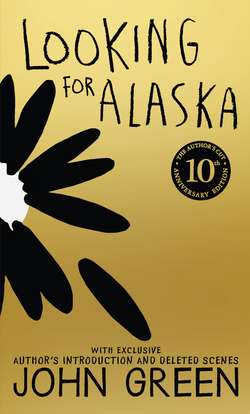Читать книгу Looking For Alaska - John Green, John Green, John (Author) Green - Страница 6
introduction
ОглавлениеIt is a funny business, to introduce a book you published ten years ago. In some ways, I am the least qualified person to write this—for one thing, authors are notoriously poor when it comes to assessing their own work (nothing makes me shudder more than hearing an author friend tell me, “I’ve just written my best book yet”). For another, I last read Looking for Alaska in January, 2005, so among almost everyone who has ever read the book, my memories are the most distant.
Looking for Alaska began for me in September of 2001. I was working at Booklist magazine as an editorial assistant and occasional book reviewer, and one of my editors, the children’s book author Ilene Cooper, was encouraging me to actually write the semi-autobiographical boarding school story I’d been pitching to her for years. She even gave me a deadline: March 1, 2002.
Then on September 11, the World Trade Center was attacked. A few days later, my girlfriend, with whom I’d been living for a couple years, broke up with me. I descended into an intense period of depression, eventually taking a leave of absence from my job at Booklist to focus on getting my mental health straightened out. On my last day at the magazine, the publisher Bill Ott wrote me a brief note: “Expect to see you back here in a couple weeks. Eat, get healthy, and—now more than ever—watch Harvey.” Bill had been bugging me to see this old movie, Harvey, for years.
My dad drove me home to Orlando, where I hadn’t really lived since leaving for boarding school when I was fifteen. I spent a couple weeks in daily therapy sessions, figuring out a medication regimen that worked, and watching a lot of TV, where the news people kept talking about 9/11, the day that changed history. Soon, they were talking about the pre-9/11 world and the post-9/11 world. One night watching cable news, I heard a psychologist say that Americans would organize their memories around that terrible day: before and after. It occurred to me that we almost always measure time in relation to what matters most to us: In the Christian calendar, we measure distance from the birth of Jesus. In the Islamic calendar, they measure distance from the hijrah, the Muslim community’s journey from Mecca to Medina.
The story I wanted to tell—based very loosely on high school memories—was about young people whose lives are so transformed by an experience that they can only respond by reimagining time itself. I’d stumbled onto a structure that could work for the book, but I had no energy to actually write it.
And then I watched Harvey. Now, I don’t believe in epiphanies, but all I can say is this: I woke up the next morning feeling a little better, and in the years since, I have never felt quite as bad as I did before watching Harvey. Within a week, I was back in Chicago, back at work, back to being pestered by Ilene about my story. At night and on the weekends, I wrote.
On March 1, 2002, I handed Ilene forty single-spaced pages. It was a confusing jumble and only a few paragraphs of those pages made it to the final book. But Ilene saw potential in it and worked with me through many drafts over the next year, and then submitted it to publishers on my behalf. Dutton bought it, and after a few months in limbo, Julie Strauss-Gabel eventually became my editor.
The story still had a long way to go: There was no labyrinth of suffering in the manuscript that Julie first read, and no Great Perhaps. I wanted to write a novel about love and suffering and forgiveness, a novel of what in the study of religion is called “radical hope,” the idea that hope is available to all of us at all times, even unto—and after—death. I hope I pulled it off. If I did, it wasn’t because of me. It was because my parents welcomed me home, because Harvey portrayed mental illness as more than merely tragic, because Ilene and Julie believed in my work and devoted years to this novel, and because readers have looked upon it with generosity and forgiven its many flaws.
So that’s the story of my Great Perhaps. Thanks for being part of it.
